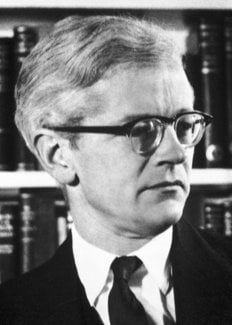John C. Kendrew
Biographical

John Cowdery Kendrew was born on 24th March, 1917, in Oxford. His father, Wilfrid George Kendrew, was Reader in Climatology in the University of Oxford; his mother, Evelyn May Graham (Sandberg) Kendrew, was an art historian, for many years resident in Florence, Italy, where she published works on the Italian Primitives under the nom de plume Evelyn Sandberg Vavals.
He was educated at the Dragon School, Oxford (1923-1930) and Clifton College, Bristol (1930-1936), and went to Trinity College, Cambridge in 1936 as a Major Scholar. He graduated in Chemistry in 1939, and spent the first few months of the war doing research on reaction kinetics in the Department of Physical Chemistry at Cambridge under the supervision of Dr. E.A. Moelwyn-Hughes. He then became a member of the Air Ministry Research Establishment (later Telecommunication Research Establishment) and worked on radar. In 1940 he joined the staff of Sir Robert Watson-Watt (Scientific Adviser to the Air Ministry) and for the rest of the war was engaged in operational research at Royal Air Force headquarters, successively in Coastal Command, Middle East, and South East Asia (where he was Scientific Adviser to the Allied Air Commander-in-Chief); he held the honorary rank of Wing Commander R.A.F.
During the war years his interests became more biological, and largely owing to the influence of J.D. Bernal and L. Pauling he decided to work on the structure of proteins. He returned to Cambridge in 1946 and, in the Cavendish Laboratory, began a collaboration with Max Perutz, under the direction of Sir Lawrence Bragg. He took his Ph.D. degree in 1949 and his Sc.D. in I962. He and Perutz were the first two members of the Medical Research Council Unit at the Cavendish Laboratory, which has now achieved separate existence as the Medical Research Council Laboratory of Molecular Biology; he was Deputy Director of the former, and is now Deputy Chairman of the latter, and Director of its Division of Structural Studies.
He became a Fellow of Peterhouse in 1947, Reader at the Davy-Faraday Laboratory of the Royal Institution in London in 1954, Fellow of the Royal Society in 1960, and an honorary member of the American Society of Biological Chemists in 1962. Since 1960 he has been (part-time) Deputy to the Chief Scientific Adviser, Ministry of Defence. He is Founder and Editor-in-Chief of the Journal of Molecular Biology, and Honorary Secretary of the British Biophysical Society. In 1962, he was made Companion of the British Empire.
His research has been in the field of protein structure, and has mostly centred on the X-ray analysis of myoglobin. This project culminated in the production of a three-dimensional model of myoglobin at 6Å resolution in 1957, and an almost complete structure in 1960.
Kendrew is unmarried. His recreations are music, history of art (following his mother’s footsteps particularly Italian art), and travelling in Italy.
This autobiography/biography was written at the time of the award and first published in the book series Les Prix Nobel. It was later edited and republished in Nobel Lectures. To cite this document, always state the source as shown above.
John C. Kendrew died on August 23, 1997.
Nobel Prizes and laureates
Six prizes were awarded for achievements that have conferred the greatest benefit to humankind. The 14 laureates' work and discoveries range from quantum tunnelling to promoting democratic rights.
See them all presented here.
